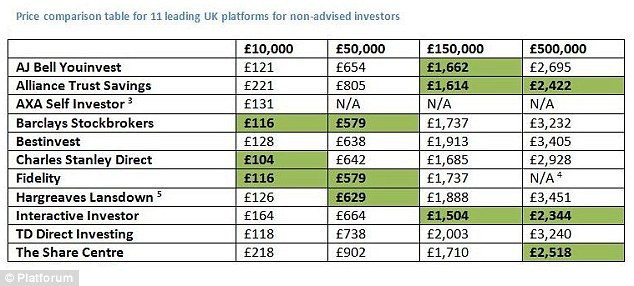Seven Guidelines to Handling Stock Brokers and Their Fees Investment U
Post on: 16 Март, 2015 No Comment

by Dr. Steve Sjuggerud Thursday, August 22, 2002 Wisdom of Wealth
by Dr. Steve Sjuggerud, Investment U Advisory Panelist
Thursday, August 22, 2002: Issue #165
We may be entering the Age of 6% — a world where a 6% return is the best that investors can expect to average in the coming decade. Or at least that’s what the world’s two most influential investors — Warren Buffett and Bill Gross — seem to think.
So as we enter this new age, we’ve got to rethink how we invest. Because, think about this. if you’re paying as much as 2% a year in total fees (which is about normal), you’re giving up a third of your profits to your broker.
This is serious. In ten years time (and accounting for compound interest), that’s a difference in return of over $30,000 on a $100,000 portfolio. And even worse, it will take you 50% longer to double your money after fees, than if you could eliminate all fees. (Of course, eliminating all fees is not possible, but you get the idea.)
Today’s message, then, is designed to help you protect as much of your own money as possible while still receiving quality service in return for those fees you do pay. And the way you do it is really quite simple: by spending just a little extra time — in some cases as little as ten minutes — you can save yourself thousands of dollars in stock broker fees over time..
Here’s What I Mean.
Last night, the title of our Investment U conference call was, How to Beat the Brokers at Their Own Game. We had four Investment U advisors on the call — Alexander Green, Karim Rahemtulla, Steve McDonald, and me. Combined, we have decades of experience on the brokerage side AND decades of experience as investors. We all know the business inside and out, from both sides of the trade.
There was plenty of time for questions and answers in addition to the prepared remarks we delivered last night. But to try and capture it all here, for those of you who didn’t attend the call, would take more time and space than we have.
Seven Guidelines for Saving on Stock Broker Fees & Handling Brokerages
So let me share a couple of highlights of the call, seven guidelines from the Investment U experts about how to best handle stock brokers — and how to go about protecting more of your hard-earned money.
1. Which Brokerage Firms Are Best?
If you’re looking for a new broker, or considering changing brokers, the website Gomez.com does an excellent job ranking brokers. For online brokers in particular, it’s very valuable. For full-service brokers, the rankings don’t matter quite as much (but they’re still valuable). The reason? It’s not hard to get a bad broker at a good firm. That’s why it’s important to get a second opinion, and a third Don’t just go with the first broker you talk to. By spending just a few extra minutes doing your homework — and using the resources that are out there — you can potentially avoid working with a bad brokerplus save thousands of dollars in fees in the process.
2. Should I Go Discount or Full Service?
Both, actually if you’re a savvy trader, you can probably get away with just a discount broker that answers the phone, like Schwab. There’s no reason to pay big commissions for investment ideas that are not the broker’s. But for many, it’s also good to have someone to talk to about the markets and your investment goals, and that’s what you should get from your full service broker. Having both a person to talk to (full service) and a cheap way to make your own investments (discount) is probably the best way to go.
3. What To Expect From Full-Service Brokers
Don’t think that a full-service stock broker can beat the market. He can’t. But what he can do is help with all your planning needs. Thank about your particular situation: what are your retirement needs. and how should you allocate your assets to get there? While we can provide general guidance at Investment U. everyone’s situation is different, and talking it over with a real person is a good thing. However, the decision, and the responsibility for that decision, is yours, not the broker’s. While the broker’s guidance can be good, be skeptical of in-house products they may pitch — they often carry high broker fees and don’t have great track records.
4. Know Your Broker
Remember, this person has your money. You have every right to know all about them. His or her career is public information. Go to www.nasdr.com and check out their complaint file. Ask them to explain those complaints. If you’re not satisfied with the answers, move along. Ask to see their U-4, a file which summarizes employment history for the last ten years. Then you’ll know for sure if they’ve really been handling clients’ money for ten years, or if they were flipping burgers last year. Again investigating your broker’s background — using the tools and information available to you — can be done in a half-hour or less. Just a little extra effort here can go a long way. Know all you can. They’ve got your money!

5. My Broker Stinks, But I’m Afraid To Switch
Do it! Switch! It’s actually easy. And you don’t even have to talk to your broker, so don’t hesitate. Look, there are good brokers and bad brokers. Find a good one. The form is called an ACAT. You talk to your new broker, tell him you want to switch your account over to them, and he fills out an ACAT form. Voila! Your assets move from your old broker to your new one. Quite frankly, you don’t even have to talk to your old broker to do this. I’ve seen too many examples of individuals who stayed with a bad broker for far too long just because they felt like switching would be a great deal of effort. It’s NOT!
6. Complaint Resolution
If you feel your broker has defrauded you in some way, you first take it up with the brokerage firm’s manager. If you are not satisfied with how the matter is handled, then you contact the NASD. When there is a legitimate dispute, it generally goes the way of the customer. However, be aware that you’re generally not taking the firm or the industry to the cleaners. Your particular broker will usually be personally responsible for making you whole again.
7. Are There Cost Savings Using a Flat Broker Fee or Pay Per Trade?
With a full-service stock broker, the flat-fee plan aligns your best interests with the broker’s. If you pay 1% a year, all-inclusive, you know that when broker calls, it’s because they honestly think there is a good investment for you. They only make more money next year if the value of your portfolio goes up. On the other hand, when you pay per trade, you can’t be certain if they’re calling because it’s best for you, or because they’re trying to meet their sales goal for the month, which will pay them out a lot more money.
Conclusions on Managing Stock Broker Fees
I’ve really just scratched the surface here. But these seven guidelines are good for all times. By following this advice — and spending just a little bit of extra time researching your broker — you can avoid having a bad experience. And you can potentially take a bite out of the normal fees of 2% — which, in today’s climate could be one third of your profits — with just a little extra effort.
Asking a lot of questions might feel uncomfortable, but don’t let this stop you. Heck, this broker — someone you probably don’t know much about — knows how much money you have, where you live, and everything about your finances.
It’s only right that you know about the person who has your money. So ask. Your stock broker has heard the questions before. It’s public information. If he or she balks, they’ve got something to hide. If anything, they’ll at least know that you’re a savvy client that can’t be taken advantage of, and you’ll be better served by their services.














